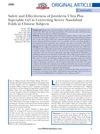
Search
for
Sort by
Research
30-60 / 1000+ results

research Ethnic Hair Update: Past and Present
Dermatologists need to understand African American hair-care practices to better treat their hair and scalp disorders.

research Dermatological Manifestations of Down's Syndrome
People with Down's syndrome often have more skin problems due to a weak immune system.

research Philosophy and Technique in Hair Restoration Surgery
Hair restoration surgery has evolved over time, with a focus on natural-looking results and managing patient expectations, while also considering potential complications and the lifelong progression of male pattern baldness.

research Health-Related Quality of Life and Physical Well-Being Among a 63-Year-Old Cohort of Women With Androgenetic Alopecia: A Finnish Population-Based Study
Women with androgenetic alopecia experience worse physical well-being and quality of life, but similar mental health compared to those without it.

research A Child with Nonscarring Alopecia
A 4-year-old girl was diagnosed with trichotillomania, a condition where she pulls out her hair, which may resolve on its own or require therapy.

research Psychological Interventions in the Management of Common Skin Conditions
Using psychological treatments can help manage skin conditions along with regular medical care.

research Evaluation of the Effects of COVID-19 Pandemic on Hair Diseases Through a Web-Based Questionnaire
The COVID-19 pandemic led to an increase in untreated hair diseases and showed the importance of teledermatology.

research Sexuality in Premature Ovarian Insufficiency
Premature ovarian insufficiency (POI) can harm women's sexual health, and they may benefit from hormone therapy and counseling.

research Obsessive-Compulsive Disorder in Dermatology
Skin doctors should recognize and treat conditions like hair-pulling and skin-picking early, often using therapy and medication, to help 50-70% of patients.

research Self-Concept and Body Image of People Living with Lupus: A Systematic Review
Lupus patients' body image issues significantly affect their mental health and need more support.

research Tips for Addressing Common Conditions Affecting Pediatric and Adolescent Patients with Skin of Color
Dermatologists should understand cultural practices and communicate empathetically to effectively treat skin conditions in children and teens of color.

research In Silico Analysis of Gene Expression Data from Bald Frontal and Haired Occipital Scalp to Identify Candidate Genes in Male Androgenetic Alopecia
Found 32 genes linked to male baldness, affecting hair growth and stress-related pathways.

research A Retrospective Review of Pediatric Alopecia Areata Cases Seen in a Tertiary Institution in Singapore
Most children with alopecia areata improved with treatment, but those with more hair loss had worse outcomes.

research Abstracts from the 17th Congress of the European Society for Dermatology and Psychiatry
The congress showed that psychological therapy can help skin condition patients, social media affects acne stigma, education improves atopic dermatitis, and patient satisfaction in dermatology is high, especially with good doctor engagement.

research Hair and Cancer Chemotherapy: Consequences and Nursing Care - A Literature Study
Chemotherapy-induced hair loss significantly affects patients' well-being, and nurses are key in helping them cope, but more research is needed to find effective treatments.

research Clinical and Biological Impact of the Exposome on the Skin
Environmental factors, hormones, nutrition, and stress all significantly affect skin health and aging.

research Presentation, Impact and Prevention of Chemotherapy-Induced Hair Loss: Scalp Cooling Potentials and Limitations
Scalp cooling can reduce chemotherapy-induced hair loss and should be available in all hospitals.

research Anxiety, Depression, and Quality of Life in Women with Polycystic Ovarian Syndrome
Women with PCOS often experience anxiety, depression, and a lower quality of life.

research Health-Related Quality of Life and Psychological Distress in Polycystic Ovary Syndrome: A Hidden Facet in South Asian Women
South Asian women with PCOS experience more psychological distress and have a poorer quality of life, especially in social relationships, with hirsutism affecting them more than obesity.

research Mood Disorders and Quality of Life in Polycystic Ovary Syndrome
Women with PCOS often have mood disorders and a lower quality of life, and treatment should focus on both physical and mental health.

research Surgical Approach to Adolescent Obesity
Bariatric surgery may help severely obese teenagers but has risks and requires careful patient selection and long-term care.

research Lifestyle and Physiological Factors Associated with Facial Wrinkling in Men and Women
Age, smoking, and lower BMI increase facial wrinkles; men wrinkle more than women, except in old age; pale skin and certain hormonal factors can protect against wrinkles.

research The Suitability of Polycystic Ovary Syndrome-Specific Questionnaires for Measuring the Impact of PCOS on Quality of Life in Clinical Trials
The PCOS-specific questionnaire needs more work to fully measure quality of life in clinical trials.

research Distribution of Childhood Skin Diseases According to Age and Gender: A Single Institution Experience
Skin diseases in Turkish children vary by age and gender, with infections, eczema, acne, and allergies most common.

research Medical Options for Care of Gender Diverse and Transgender Youth
Early medical support for transgender youth is important for their health, with low regret for gender-affirming hormone use and a need for knowledgeable care providers.

research Safety and Effectiveness of Juvéderm Ultra Plus Injectable Gel in Correcting Severe Nasolabial Folds in Chinese Subjects
Juvéderm Ultra Plus is safe and effective for treating severe nasolabial folds in Chinese subjects.

research Diverse Cellular Players Orchestrate Regeneration After Wounding
Different cell types work together to repair skin, and targeting them may improve healing and reduce scarring.

research Office Management of the Adolescent with Diabetes Mellitus
The document recommends a team-based approach and personalized care for managing diabetes in teenagers.

research A Practitioner's Guide to Hair Loss Part 1: History, Biology, Genetics, Prevention, Conventional Treatments, and Herbals
The document concludes that hair loss is influenced by genetics and other factors, and while treatments like finasteride can help, they have limitations and side effects.